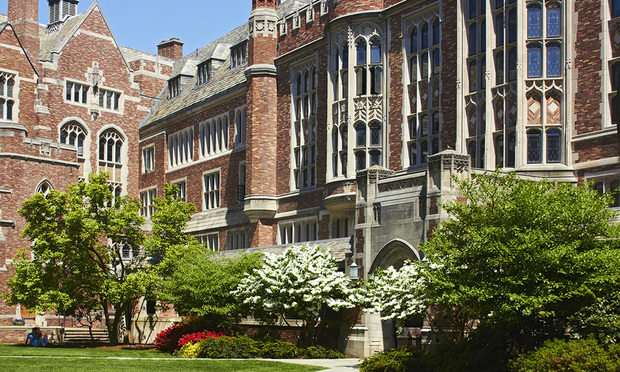Yale Law Students Win Gender-Neutral Bathroom Battle
A group of students successfully challenged a Connecticut building code that prohibited the school from converting single-gender restrooms into gender-neutral ones.
February 01, 2019 at 01:29 PM
2 minute read
The original version of this story was published on Connecticut Law Tribune
 Yale Law School.
Yale Law School.
Students at Yale Law School recently celebrated the addition of two new bathrooms to the law campus, but it's not shiny faucets or sparking tile that had them excited.
They're the school's first multi-stall, gender neutral bathrooms and the fruits of years of advocacy by student groups and legal action challenging Connecticut's building codes.
The school's OutLaws—and organization that supports lesbian, gay, bisexual, transgender, and queer members of the law school community—led the charge for more gender neutral bathrooms, with the support of the law school administration. The law campus now has 20 gender neutral stalls, counting the latest additions. Previously, only single stall bathrooms were designated as gender neutral.
“I think it's a really positive step,” OutLaws co-president and second-year law students Hannah Hussey told the Yale Daily News. “Obviously gender equity is multifaceted, and this is one piece among many, but I think it sends a really strong message that [Yale Law School] recognizes that gender is not always a binary.”
Students began their campaign for gender-neutral restrooms in 2016, arguing that transgender students and other non-binary students sometime feel uncomfortable using bathrooms designated for either men or women, and that the existing gender-neutral bathrooms were in inconvenient locations.
But their efforts ran up against Connecticut's building codes, which require a certain number restrooms for men and women in every building. Gender-neutral bathrooms don't count towards those totals, and building additional bathrooms into the law school's historic 1920s Sterling Law Building would be difficult.
The law school was denied an exemption from the code in 2017, and sued in June asking the court overrule the decision from the state's Codes and Standards Committee. Former Governor Dannel Malloy then intervened to grant the school's request.
“This effort involved community discussions, taking into consideration the concerns raised about religious and cultural differences,” said Ellen Cosgrove, the law school's dean for student affairs. “Next, our students led a protracted litigation effort, advocating for changes to Connecticut law. We were fortunate that our former dean and current dean supported the student effort and we're grateful to the University's Office of the General Counsel for their work on this initiative.”
This content has been archived. It is available through our partners, LexisNexis® and Bloomberg Law.
To view this content, please continue to their sites.
Not a Lexis Subscriber?
Subscribe Now
Not a Bloomberg Law Subscriber?
Subscribe Now
NOT FOR REPRINT
© 2025 ALM Global, LLC, All Rights Reserved. Request academic re-use from www.copyright.com. All other uses, submit a request to [email protected]. For more information visit Asset & Logo Licensing.
You Might Like
View All
The Week in Data Jan. 24: A Look at Legal Industry Trends by the Numbers


University of Chicago Accused of Evicting Student for Attending Gaza-Israel Protest
3 minute read
Sanctioned Penn Law Professor Amy Wax Sues University, Alleging Discrimination
5 minute readTrending Stories
- 1We the People?
- 2New York-Based Skadden Team Joins White & Case Group in Mexico City for Citigroup Demerger
- 3No Two Wildfires Alike: Lawyers Take Different Legal Strategies in California
- 4Poop-Themed Dog Toy OK as Parody, but Still Tarnished Jack Daniel’s Brand, Court Says
- 5Meet the New President of NY's Association of Trial Court Jurists
Who Got The Work
J. Brugh Lower of Gibbons has entered an appearance for industrial equipment supplier Devco Corporation in a pending trademark infringement lawsuit. The suit, accusing the defendant of selling knock-off Graco products, was filed Dec. 18 in New Jersey District Court by Rivkin Radler on behalf of Graco Inc. and Graco Minnesota. The case, assigned to U.S. District Judge Zahid N. Quraishi, is 3:24-cv-11294, Graco Inc. et al v. Devco Corporation.
Who Got The Work
Rebecca Maller-Stein and Kent A. Yalowitz of Arnold & Porter Kaye Scholer have entered their appearances for Hanaco Venture Capital and its executives, Lior Prosor and David Frankel, in a pending securities lawsuit. The action, filed on Dec. 24 in New York Southern District Court by Zell, Aron & Co. on behalf of Goldeneye Advisors, accuses the defendants of negligently and fraudulently managing the plaintiff's $1 million investment. The case, assigned to U.S. District Judge Vernon S. Broderick, is 1:24-cv-09918, Goldeneye Advisors, LLC v. Hanaco Venture Capital, Ltd. et al.
Who Got The Work
Attorneys from A&O Shearman has stepped in as defense counsel for Toronto-Dominion Bank and other defendants in a pending securities class action. The suit, filed Dec. 11 in New York Southern District Court by Bleichmar Fonti & Auld, accuses the defendants of concealing the bank's 'pervasive' deficiencies in regards to its compliance with the Bank Secrecy Act and the quality of its anti-money laundering controls. The case, assigned to U.S. District Judge Arun Subramanian, is 1:24-cv-09445, Gonzalez v. The Toronto-Dominion Bank et al.
Who Got The Work
Crown Castle International, a Pennsylvania company providing shared communications infrastructure, has turned to Luke D. Wolf of Gordon Rees Scully Mansukhani to fend off a pending breach-of-contract lawsuit. The court action, filed Nov. 25 in Michigan Eastern District Court by Hooper Hathaway PC on behalf of The Town Residences LLC, accuses Crown Castle of failing to transfer approximately $30,000 in utility payments from T-Mobile in breach of a roof-top lease and assignment agreement. The case, assigned to U.S. District Judge Susan K. Declercq, is 2:24-cv-13131, The Town Residences LLC v. T-Mobile US, Inc. et al.
Who Got The Work
Wilfred P. Coronato and Daniel M. Schwartz of McCarter & English have stepped in as defense counsel to Electrolux Home Products Inc. in a pending product liability lawsuit. The court action, filed Nov. 26 in New York Eastern District Court by Poulos Lopiccolo PC and Nagel Rice LLP on behalf of David Stern, alleges that the defendant's refrigerators’ drawers and shelving repeatedly break and fall apart within months after purchase. The case, assigned to U.S. District Judge Joan M. Azrack, is 2:24-cv-08204, Stern v. Electrolux Home Products, Inc.
Featured Firms
Law Offices of Gary Martin Hays & Associates, P.C.
(470) 294-1674
Law Offices of Mark E. Salomone
(857) 444-6468
Smith & Hassler
(713) 739-1250








